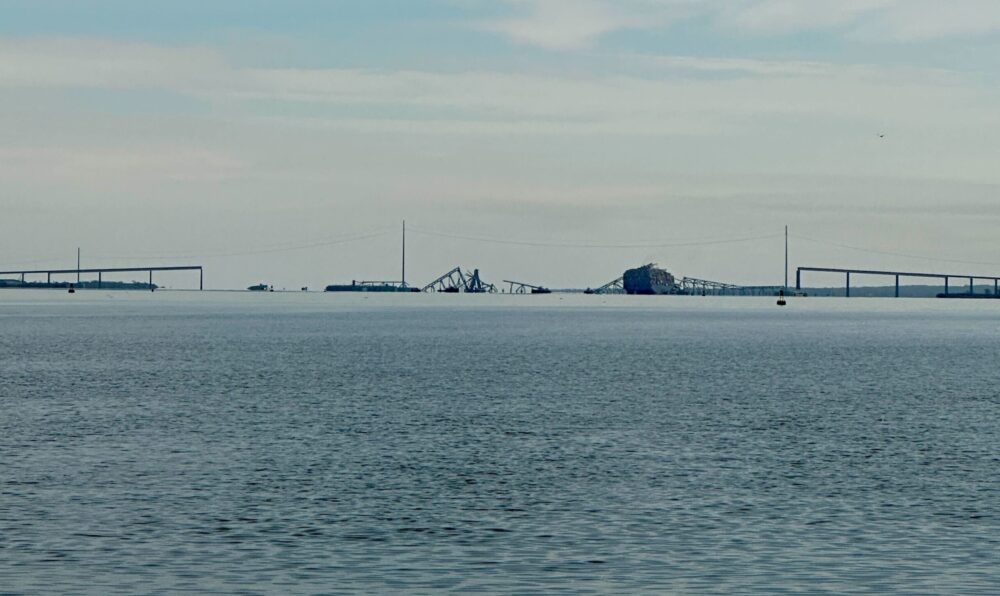WASHINGTON – Hours after Baltimore’s Francis Scott Key Bridge collapsed last March, President Joe Biden pledged that the federal government would pay for the entire replacement. The president and Congress are now attempting to fulfill that promise.
Biden sent a letter Monday to House Speaker Mike Johnson, R-Louisiana, asking him for a $98 billion supplemental spending package for emergency disaster relief.
The proposed spending would help reimburse agencies that are working on recovery from the Key Bridge collapse, Hurricanes Milton and Hurricane Helene and other recent disasters.
Lawmakers on Capitol Hill – including Maryland Democratic Reps. Steny Hoyer and Jamie Raskin – are optimistic that some form of disaster funding will pass before the end of this Congress, targeted to end on Dec. 20.
“Hopefully we’re going to move forward with the president’s disaster relief, which I think on a bipartisan basis, people are concerned about it because Republicans and Democrats have both seen their populations experience loss,” Hoyer told Capital News Service Tuesday.
While Johnson has not specified the amount of disaster funding he would be willing to approve, he did express an openness to sending aid to areas impacted by the hurricanes.
“We’re going to continue to provide for the American people with resources that are desperately needed,” Johnson said during a Tuesday news conference.
Congress passed a disaster relief bill in 2022, but has not approved additional disaster aid despite repeated requests from the Biden administration.
“Disasters are not red or blue or Democrat or Republican, but they affect all Americans,” Raskin told CNS Tuesday. “That would be a real dereliction of duty if we didn’t do it.”
The Key Bridge collapsed into the Patapsco River on March 26 after a large container ship crashed into a support column. Six construction workers who were on the bridge were killed.
The collapse closed the Port of Baltimore for over 11 weeks.
Currently, 90% of the recovery and rebuilding of the Key Bridge is being paid for through the Federal Highway Administration’s emergency fund. The Maryland delegation and Biden have pushed for the federal government to pay for 100% of the rebuilding, which requires congressional approval.
That 100% funding could come through Biden’s proposed package.
The president’s request sets aside over $100 million specifically to replenish funds after the Key Bridge collapse. This includes $79.5 million for the U.S. Coast Guard to cover unplanned costs associated with its response to the bridge collapse and $33 million for the Harbor Maintenance Trust Fund of the U.S. Army Corps of Engineers to replenish funds used to remove bridge wreckage from the water and reopen the shipping channel.
The Key Bridge would also get portions of the $8 billion for the Department of Transportation’s emergency relief program and the $150 million set aside for the Department of Labor’s training and employment service.
Until the current Congress ends next month, Maryland has four lawmakers on the House Appropriations Committee and one member on the Senate Appropriations Committee – the two panels that determine the size of spending bills.
There has been pushback from some lawmakers over whether the bridge should be funded totally by the federal government because the bridge collapse was caused by a ship and not by a natural disaster.
The Senate committee held a hearing Wednesday, where Transportation Secretary Pete Buttigieg testified in support of the disaster relief package, including for the Key Bridge.
“…The destruction of the Key Bridge,” Buttigieg said, was “something that is of not just local or regional but national significance when you consider its impact on supply chains.”
“This is something that happened through no fault of the communities that were directly impacted,” he said.
Biden’s plans also indicate that if the Corps of Engineers receives funds from the recent settlement agreement between the Department of Justice and the corporations that own and operate the container ship that hit the bridge, the funding would not be necessary.
Rep. Andy Harris, R-Maryland, told CNS Wednesday that he will have to see where the proposal goes to commit to voting on it.
Harris is the new chairman of the House Freedom Caucus, which generally advocates lower government spending. But the Republican in the past has been a supporter of Key Bridge funding efforts.

